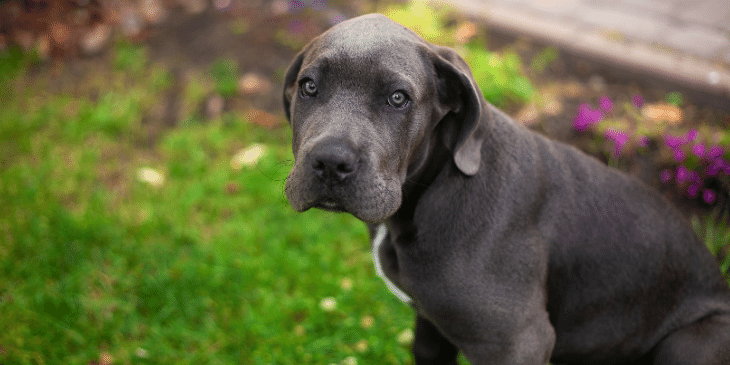Puppy Constipation: Causes, Symptoms, & Treatment

Contents
Uh oh! Your puppy is straining to poop, but nothing is happening. He might even be whining when he tries to go or pacing around the house in obvious discomfort. You just know something isn’t right!
Seeing your puppy in distress isn’t fun for any pet parent. You probably have a million questions running through your mind. Does your puppy need to go to the vet? What’s causing your puppy to be constipated in the first place? And most importantly, what can you do to help?
Puppy constipation is quite common and many times there’s an easy fix. But it’s also possible that your puppy may have ingested something that’s causing an intestinal blockage, which could be life-threatening.
Today, we’re going to discuss the most common causes and symptoms of puppy constipation. We’ll also dive into some safe home remedies for occasional constipation in puppies and offer some guidelines to help you know when it’s time to call the vet.
Common Causes of Puppy Constipation and How to Prevent It
Here are the most common causes of constipation in puppies:
· Improper Diet
In most cases, puppy constipation is related in some way to the diet. Improper diet can cause waste to sit in the puppy’s colon for too long, often due to lack of fiber or moisture in the food. The unpassed stool becomes dry and hard, which makes it difficult to pass.
Fiber is crucial for moving stool through the puppy’s digestive system. It’s essential for bulky up the stool and ensuring that it’s not too hard to pass, but not too loose either. Moisture content is also essential for moving the stool through the colon and passing it easily.
Low-quality puppy food could also be a contributing factor. Food that’s full of cheap fillers, like corn and soy, can cause digestive issues. Foods that are full of preservatives and artificial ingredients can also cause issues with digestion. Sudden changes to the diet can also contribute to constipation and other digestive issues.
The best way to prevent puppy constipation due to improper diet is to feed a veterinarian-approved, high-quality puppy food. Offer a combination of wet and dry food to ensure that your puppy is getting enough fiber and moisture in his diet. And, if you decide to change his diet, do it gradually over several days to give his digestive system a chance to adapt.
· Bowel Obstruction
If a puppy’s bowel becomes obstructed by a foreign object, he won’t be able to pass a bowel movement. This leads to a painful buildup of waste in the colon, which requires immediate emergency care.
Unfortunately, puppies are curious by nature, and their favorite way to explore is with their mouth. Bowel obstructions generally occur when the puppy eats something that he can’t digest, such as bones, rawhide, toys, or plastic bags.
In fact, it’s not uncommon for puppies to ingest large amounts of hair or grass… or even an entire pair of underwear. Yikes!!! As you can imagine, when such an item enters the digestive system, it slows down or completely blocks the movement of waste.
The best way to prevent a bowel obstruction is to puppy-proof your home and supervise your puppy. Anytime you can’t supervise him, he should be in his crate or playpen. Don’t allow him to eat something he shouldn’t in the first place.
Bowel obstructions can be life-threatening. Anytime you suspect that your puppy could have a bowel obstruction, it warrants immediate emergency care at the closest available vet.
· Mechanical Obstruction
Mechanical obstructions that prevent your dog from passing stool can also cause constipation. Matted hair over the opening of the anus is a common mechanical obstruction that can easily be prevented by keeping hair trimmed away from the area.
Full or impacted anal glands can also cause a mechanical obstruction and lead to constipation. If your dog is scooting his rear across the floor, there’s a good chance he needs to see a professional to have his anal glands emptied.
· Stress
If your puppy has recently experienced a major change to his routine, stress could be contributing to his constipation. Puppies are very susceptible to stress, whether it’s leaving their mom and littermates for their forever home, a stressful car ride or vet visit, or a houseful of company he doesn’t know.
Much like humans, stress can have a major impact on your puppy’s digestion. Lack of proper digestion causes a backup of waste in the colon, which leads to constipation. To make matters worse, when a puppy is under stress, he often experiences muscle tension that can make it difficult for him to have a bowel movement.
Thankfully, puppy constipation caused by stress usually resolves on its own in a day or two. But if the situation seems severe or lasts longer than two days, give your vet a call.
· Lack of Exercise
Although it’s rare to find a puppy that lays around all day, if your puppy isn’t getting enough exercise, it may be contributing to his constipation. Exercise helps the bowels move normally. Sometimes, a long walk just might be all that’s needed to correct the situation. Daily dog walks can also help to prevent anxiety, obesity, and a host of other issues for your puppy.
· Illness
Although it’s relatively rare in puppies, constipation can sometimes be a symptom of another illness. Things like a hernia, tumor, kidney disease, or bacterial infection can impact digestion and cause constipation in puppies.
If your puppy experiences the symptoms of constipation for more than two days, or experiences constipation frequently, visit the vet to rule out any underlying health issues.
· Side Effects of Medication
If your puppy is currently taking medication, ask your vet if his constipation could be a side effect of the drug. Many prescription and over-the-counter drugs can cause constipation in puppies, so never administer any drug without running it by your vet.
If you suspect that a medication is causing your puppy’s constipation, call the vet to see if there’s an alternative treatment available. Increasing your puppy’s water intake and activity level may also help get things moving again.
· Surgery
It’s not uncommon for a puppy to experience a little bit of constipation after surgery. This is often due to the combined effects of the anesthesia and lack of activity. Your puppy could also be experiencing some pain or discomfort that’s making him reluctant to pass a bowel movement.
Waste buildup in the colon could be causing constipation. If the situation doesn’t resolve in a day or two, check with the vet for advice.
The Symptoms of Constipation in Puppies
Here are the most common symptoms of puppy constipation:
- Fewer than two or three bowel movements per day
- 24 hours without having any bowel movement at all
- Infrequent bowel movements for two or three days in a row
- Dry, hard stools that are difficult to pass
- Straining without producing a bowel movement
- Whining or other signs of pain when attempting to poop
- Restlessness, pacing, or an inability to get comfortable
- Loss of appetite and/or lethargy
Home Remedies for Puppy Constipation
Occasional, mild constipation in puppies can often be treated at home.
Here are some safe home remedies for constipation in puppies:
- Pumpkin: Pumpkin is very high in fiber and water, so it can help bulk up and loosen the stool naturally. It’s one of many fruits and vegetables that your puppy can eat safely to enhance his diet. Mix about a tablespoon of plain canned or freshly pureed pure pumpkin into your puppy’s food to see if it stimulates a bowel movement. You can continue the treatment with each meal for as long as it takes him to produce a bowel movement.
- Exercise and Hydration: Get your pup moving with a long walk or a game of fetch. Getting him active can get his bowels moving. It will also encourage him to drink more water, which can help relieve constipation.
- Metamucil (Psyllium): Puppy constipation can also be treated at home with psyllium powder, which is marketed under the brand name Metamucil. Here are the correct dosages and guidelines for administering Metamucil to your puppy at home.
When to Call the Vet
If your puppy has occasional constipation that’s easily treated with one of the home remedies recommended above, it’s probably nothing to be concerned about. But if your puppy doesn’t produce a healthy bowel movement for more than 72 hours, or he becomes constipated often, you should call the vet to rule out an underlying health issue.
However, if your puppy’s constipation is accompanied by vomiting, drooling, bloating, or extreme pain, take him to the vet immediately. He could be experiencing a bowel obstruction or even poisoning. In either situation, emergency treatment will be required, and acting quickly may save your puppy’s life.
Once your vet has ruled out any major health concerns, he will probably recommend a mild, dog-safe laxative to treat your puppy’s constipation. In more severe cases, an enema or manual extraction of the impacted stool may be required.
Frequently Asked Questions About Puppy Constipation
Here are some of the most frequently asked questions about constipation in puppies.
How do I know if my puppy is constipated?
If your puppy isn’t producing two or three healthy bowel movements each day, he is probably constipated.
What can I give my puppy for constipation?
Exercise and hydration are often all that’s required to relieve mild constipation in puppies. However, pure pumpkin puree and psyllium powder (Metamucil) are also safe and effective remedies when administered as outlined in this article.
How do you stimulate a puppy to poop?
The best way to stimulate a puppy to poop is to get him moving. Take him for a long walk or head out back for a game of fetch. The activity will get his bowels moving and encourage him to drink water, both of which can stimulate a bowel movement.
Why is my puppy not pooping?
Many things could be preventing your puppy from pooping. However, a diet that’s too low in moisture and fiber is the most common cause. Providing a high-quality diet that includes both canned and dry food will help to ensure he’s getting adequate amounts of each. Check out the article above for additional tips and other potential causes of constipation in puppies.
How do I know if my puppy has a blockage?
If your puppy’s constipation is accompanied by drooling, bloating, vomiting, lethargy, or abdominal pain, he may have a blockage. If you suspect a blockage, head to the emergency vet immediately! Your quick action could save your puppy’s life.
